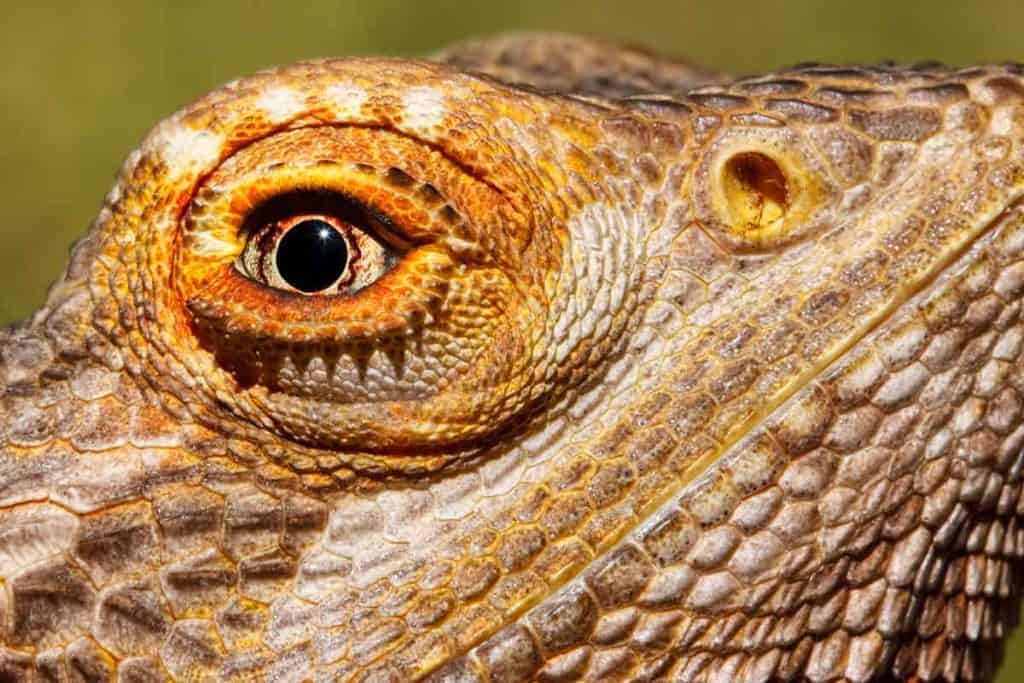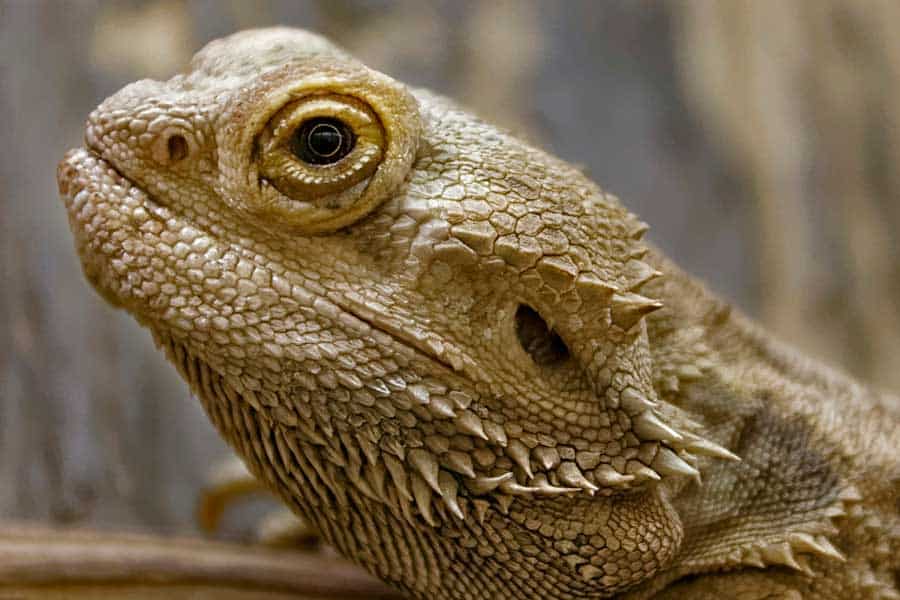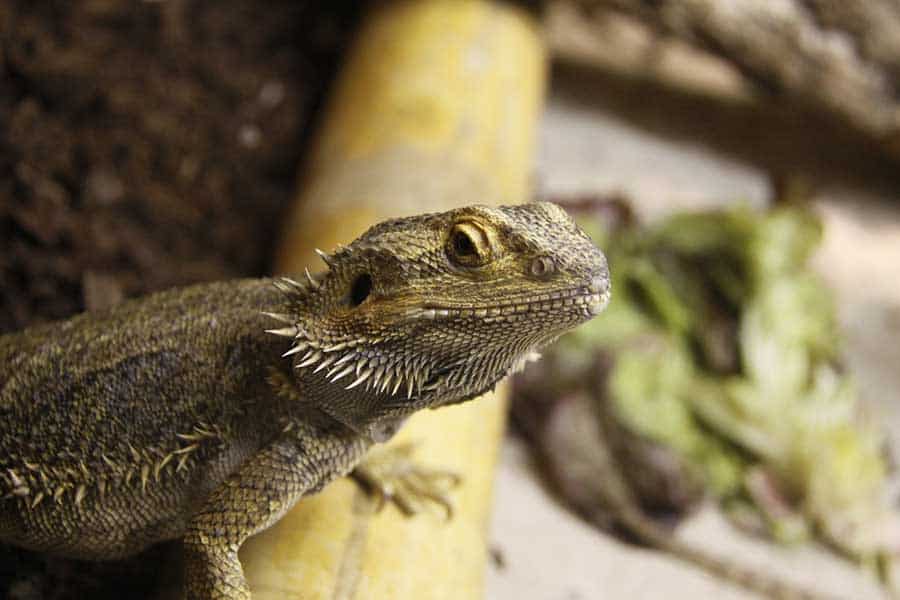When bearded dragons have sunken eyes, it is a clear sign there is something wrong with them. More specifically, it is often indicative of dehydration, parasite infestation, physical illness, and/or a severe loss of weight.
It is important to know how to identify sunken eyes and then get to investigate their cause. Once you have determined the cause, in most cases, it is fairly easy to fix what is wrong with them in time to reverse any serious damage to their bodies.
Luckily, it is easy to see when your treatment plan is working because your bearded dragon’s eyes will go back to normal and their color will return to the bright vibrance it once was. Let’s look at all the possible causes and treatments for sunken eyes in bearded dragons below.
Causes of Sunken Eyes
Dehydration
Dehydration is one of the main causes of many sicknesses in bearded dragons. Although bearded dragons look like they do not need a lot of water (after all, they are native to one of the world’s harshest deserts!), they are, in fact, thirsty lizards who require a significant amount of water in their diet to thrive.
They get this water from various sources, including their water dish, their food, and the water droplets that form on them and their surroundings when you mist their enclosures every day. Maintaining the enclosure settings, specifically temperature and humidity, is very important because it helps them to maintain their hydration levels.
There are a few different ways dehydration can occur in bearded dragons; below are the most common causes and their treatments.
1. Dehydration Due to Lack of Drinkable Water
Bearded dragons need constant access to water in their enclosures. They are hardy, desert-dwelling creatures, and so some people mistakenly think these lizards do not need to drink water. But even though they come from Australia, bearded dragons can drink a surprising amount of water a day!
This means they will need a small dish of fresh water that is short enough for them to reach into without straining their necks. The water dish also needs to be heavy enough that it will not be toppled over. Ideally, it should be non-porous for easy cleaning and to prevent bacterial buildup.
Unfortunately, bearded dragons do not always recognize standing water as actual water! Therefore, they end up dehydrating because they do not realize there is water right in front of them.
Installing a small dripping system in the enclosure can help your bearded dragon recognize the water as drinking water. However, this is a long-term fix and will not treat the immediate problem.
To start treating your dehydrated bearded dragon, include a lot of watery food like cucumbers, and light lettuces. Include more greens in your bearded dragon’s diet to maintain hydration. Check out our guide on the best greens to give your beardie bestie!
Including a little more fruit in your bearded dragon’s diet for a short period of time can also help them increase their hydration rapidly. Check out our article dedicated to finding the best and healthiest fruit for your bearded dragon!
2. Dehydration Due to Low Humidity
The humidity percentage refers to the amount of water vapor present in the air. Bearded dragon enclosures should have a humidity range of 20% to 40%.
When the humidity is too low, water is drawn out of your lizard’s body the same way your lips become chapped in very dry weather! When the water is being drawn from their bodies, their eyes will look sunken in.
Installing a quality hygrometer in the enclosure is essential to monitoring the humidity levels in the enclosure at all times in the long run.
However, to treat a dry environment, you should maintain a strict daily misting schedule either once or twice a day depending on the outside climate.
If your bearded dragon is severely dehydrated due to a dry environment, you can soak them for 10 to 20 minutes a day in a bath of warm water. They will likely try to drink this water, so make sure it is clean.
3. Dehydration Due to High Temperatures
Unnecessarily high temperatures in a bearded dragon enclosure can lead to excessive drooling and dehydration. Without the ability to move to a cooler spot in their enclosure, your bearded dragon will use up all of the moisture in its body very quickly and dehydrate.
Your bearded dragon should have a stable temperature gradient of 75°F to 85°F in their enclosure. This means the cooler end of the enclosure should sit at around 75°F, and the warm end should be at 85°F with a basking spot of 90°F at its hottest point.
If you think that your bearded dragon has sunken eyes because it is dehydrated from overheating, then check all of your heating equipment from your under tank heating mat, to the basking bulb, to your thermometers.
Sometimes, the thermostat on the heating mat is broken or the wattage of the basking bulb is too high. If this is the case, adjust the settings. If all of the settings are fine, then you may want to reduce them by 2 to 3 degrees, as your bearded dragon may just need a slightly cooler environment.
Other Signs of Dehydration Besides Sunken Eyes
There are many signs of dehydration in bearded dragons. Other signs of dehydration include thick, sticky drool, dark and smelly poops and urates, yellow eyes, sagging skin, and a bright red tongue. Check out our article dedicated to helping you spot and care for your dehydrated bearded dragon.
Parasites
Another common cause of sunken eyes in bearded dragons is parasite infestations. External parasites, like mites, attack the softer areas of your bearded dragon’s body. They look for soft skin to burrow under to feed on your beardie’s blood. Mites look like small red or black dots that are visible to the naked eye.
It is common to find them clustered around bearded dragon’s eyes as main infestation sites. They attack the eyes because they are soft, have a lot of moisture and high blood flow which is the perfect feasting ground.
When these parasites latch on to your beardie’s eyes, they will dig themselves in and set in to eat and lay eggs. It is fairly obvious when looking at your bearded dragon’s eyes when there is an infestation.
Mites also carry their own bugaboos that can infect your bearded dragon via the mites’ bites.
What to Do About It
If you notice your bearded dragon has a mite infestation, it is advisable that you get some medication from your exotic vet that will clear out any internal parasites.
While treating the inside of your bearded dragon, you need to treat the outside, too. Remove them from their enclosure and give them a good bath.
Once you are sure they are nice and clean, place them in a secondary enclosure that is clean and not contaminated. In this new enclosure, provide them with lots of fresh water to drink from and a healthy meal.
After that, you will need to do a full sanitization and sterilization of their old enclosure, including any plants, substrate, and decorations that were inside the enclosure.
Mites do not go away immediately, as they are easily transferred between enclosures, on cloths, your clothes, decorations, and tools. So keep a careful eye on your beardie’s sunken eyes to make sure they are not being infested.
Physical Illness
Certain physical illnesses like kidney failure, impaction, and gum rot can also lead to sunken eyes.
Kidney disease and failure mean your bearded dragon is not filtering its blood correctly due to stress, infection, or poor diet, and this can lead to dehydration and sunken eyes.
Impactions happen when there is a blockage in the digestive system. This blockage is usually caused by a piece of food that is too big or loose, indigestible substrate that has been swallowed with food. The blockage causes a reduction in the amount of nutrients being absorbed into the body, which can lead to dehydration and sunken in eyes.
Gum rot can happen for a number of reasons. There may be some food stuck between their teeth (usually fruit) that has begun to rot and ferment, which has led to the gums starting to rot. Alternatively, your beardie may have an infection which has caused the rot.
Gum rot is very painful and causes extra pain to your bearded dragon when it is trying to eat or drink. This, as well as any associated infection, will lead to dehydration, which results in sunken eyes.
What to Do About It
Diagnosing and treating certain illnesses can be difficult. Gum rot is generally easy to spot and will need antibiotics to treat it. However, kidney disease and impaction can be harder to treat.
If your bearded dragon has kidney disease, its urates will be quite orange, thick, and smell very bad. A trip to the vet is essential as your beardie will need medication.
If your bearded dragon is impacted, it will usually be constipated. You can try soaking your bearded dragon for 10 to 20 minutes a day to try to help them poop. Bearded dragons will often poop when they are in water, as it is thought the water helps them relax. However, a serious impaction will require a trip to the vet.
Weight Loss
The muscles around a bearded dragon’s eyes are normally very active and strong. If you have ever watched your bearded dragon for a period of time, you will see that their eyes are constantly roving around.
If your bearded dragon has experienced a serious loss of weight or muscle mass, it will give the appearance that the eyes have sunken in. The weight and muscle loss may be due to incorrect feeding schedules, excessive stress, or inactivity from boredom.
What to Do About It
Bearded dragons are hefty little lizards and should have a good body mass if they are being fed a healthy diet and are in a correctly sized enclosure. However, if they have suffered from weight loss, perhaps due to illness or just poor husbandry in the past, you can treat it at home fairly easily.
Increase the amount of protein your bearded dragon is eating every day by 10 to 20 percent. Improving their protein intake will help them build up healthy muscles again and put on weight that is not based on fat.
For good worms to include in your beardie’s diet, check out our guide dedicated to helping you pick out the best worms for your bearded dragon! For insects, check out our article about all of the insects that are good feeder items for your bearded dragon.
At the Tail End of Things…
When bearded dragons have sunken eyes, it is an indicator that something is wrong. If you notice the muscles and skin surrounding your bearded dragon’s eyes have lost their firmness and their eyes appear sunken in, you need to identify and treat the cause promptly.
The main cause of sunken eyes in bearded dragons is dehydration. Dehydration can then also be caused by a number of things, including a lack of drinking water, low humidity, and excessively high enclosure temperatures. These are generally easy to fix and treat.
However, other less common causes of sunken eyes can be far more serious and more difficult to diagnose and treat, and you will need a vet’s advice. Your beardie may have sunken eyes because it has a parasite infestation. It may have kidney problems, be impacted, or have gum rot. Alternatively, your beardie may have lost an excessive amount of weight or muscle due to health issues or a poor diet.




